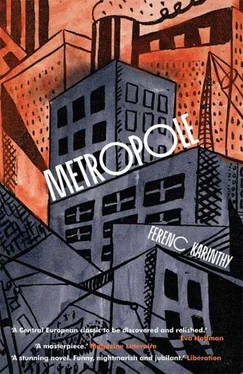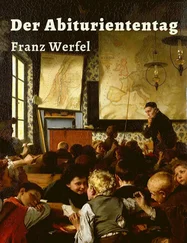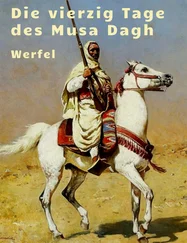One time, heading home on the metro, he was just descending the long escalators with the host of those arriving streaming past him on the way up when he suddenly spotted a man holding a Hungarian magazine. It was no mistake! There he was holding a copy of Szinházi Élet , an old theatre and stage weekly, its title clearly legible. Even the actress on the front looked faintly familiar: she was in a striped swimsuit standing on the steps of the Hullámfürdő , the pool with the artificial wave machine; the actress blonde, slender, raising her free left hand high into the air. This was such an unexpected shock that he had no sooner registered it than the man holding it, an elderly, grey, bespectacled figure in a worn green overcoat, had already passed him and was now behind him. He didn’t know what to do, had no idea what to say, but shouted out as loud as he could in Hungarian:
‘ Kérem szépen… izé, maga, ott! ’ (Excuse me!… I beg your pardon, er, you there!)
But the escalator was so loud, so squeaky and grinding, the whole place so full of commuters, the hall so echoey that the man in the overcoat couldn’t have heard him. Terrified that he would lose him, Budai screamed out once more:
‘ Halló, ide nézzen. ’ (Hello! Look this way!)
The man addressed turned round, his expression astonished, as if hearing a voice from another world. He reached uncertainly towards him in the distance perhaps only to convince himself that it was no illusion:
‘ Hát uraságod is…? ’ (And you, dear sir, are you also…?)
The rest was lost in the surrounding noise and faded in the increasing distance between them. Budai tried to turn round and follow him but the escalators were moving rather fast and were packed with people, a number of them actually rushing downwards, hurrying for trains: there was no chance — not the space or the time — of him reaching the man in the overcoat. Desperately he cried to the ever-retreating patch of green in the crowd.
‘ Várjon meg a… ’ (Wait for me at…)
But where the best place to wait in the metro actually was he could not think. He should at least have asked for the man’s address before they swept past each other, or he could have given his. True, he didn’t know the name of his hotel, nor even the street where it happened to be. In the meantime the stranger had completely disappeared in the metro traffic.
Budai was not content to let it rest there and tried to think what he would do in the other man’s place, where he would wait for someone who had called out to him like that. The nearest spot was the top of the escalators, the point where they stepped off. It was just that it was no easy task getting there from where he was, on the wrong side, because once at the bottom a metal barrier prevented him from getting over to the parallel stairs leading up and he was forced by railings down winding corridors, past intersections and down even more winding corridors before he could reverse his steps. But having found his way by devious twists and turns to the bottom of the escalators, he was no longer sure whether these were the same. At the top, once he got there, another set of escalators led further up and then another so it was difficult to decide which was the very top. He scanned the heaving throng for the man in the green overcoat but he could not find him. He couldn’t stop anywhere, of course, for the moment he slowed the crowd swept him on again.
But what if the other man was seeking him in exactly the same way, using the same logic, at the bottom of the stairs? He struggled back down again to the underground line he had taken before, where he had first spotted the man. That was the very spot where he should have leapt across or crawled across the two steep thick rubber handrails that divided them, only he hadn’t thought of it at the time. And now he didn’t find him there though he explored various draughty loud platforms. Might it be that his quarry had taken the opposite course and was waiting at the metro exit out in the street. But which exit? There were at least eight or even ten here. He continued weaving, moving between a whole series of points in the underground labyrinth but all to no avail: the single figure he was seeking among the hordes in one or other tunnel was nowhere to be found.
He was so excited he didn’t think to consider whether the meeting was a good or bad sign, but even though he hadn’t succeeded in talking to the man or establishing some kind of contact, in view of his utter isolation it was encouraging to know that he was not alone in a world of strangers. They might bump into each other again or he might meet another compatriot or at least a foreigner like himself. Next time he’d be lucky and would finally discover everything he had failed to discover so far.
On the other hand, once he got to analysing this strange brief encounter he found that there were certain disquieting aspects of the situation. The very fact that the stranger was holding a copy of Szinházi Élet for instance. The magazine had ceased publication over thirty years ago as he recalled. The old man couldn’t have been living here that long, could he? And if so, had he settled here? Or had he found himself abandoned in the city much as he himself had been? How did he get here? By what means? What form of transport? And if he had brought the magazine along as reading matter, why that very number? And had he held on to it since then? That might have accounted for the look of amazement and incredulity on his face when he turned round on hearing Budai shout after him. It would have been like hearing an echo of his own voice. And the fact that he addressed Budai as uraságod , an old, unfashionable tag, hardly ever used nowadays! And what did he mean by the wonder implied by the question Hát uraságod is…? Did he mean that the pair of them comprised a single category? Was it simply an allusion to the fact that they were both Hungarian, or, the worst thought of all, was it a sign that, like him, the old man had been vainly trying to leave the place, only in his case for over thirty years?
He spent days tortured by the thought of a missed opportunity, blaming himself, going over the events, wondering what else he might have done. And like a criminal returning to the scene of the crime, he kept going back to the metro station, hanging about for hours in case the man in the green overcoat came by again, that is if it was his customary route. This time, just this one time, let him catch his eye. And though he did not meet him again it bred a suspicion that somewhere in the eternal crowd filling the streets and the metro there might be someone else who might understand him, maybe more than one — but how would they know each other?
Working at the halls and undertaking his regular watch on the specific metro station soon gave his day some structure. Usually he ate at the self-service buffet before then walking home. On the way back he would walk past the skyscraper in construction, to which eight storeys had been added since his arrival, the builders having got to the seventy-second. How high was it planned to be? Once in the hotel he looked for Pepepé and if she was on duty they would get together; if not he’d just go to his room depressed since it was there he felt most desolate and the time passed most slowly.
The room was always punctiliously cleaned, the bed nicely made up, the towels and tablecloth regularly changed. He had no idea who carried out these duties or when because he never saw anyone. When he stayed in — even for days at a time — they did not call. One morning, out of sheer curiosity, he pretended he was leaving but took care to hide round the corner and watch the comings and goings but he saw nothing all morning. Another time when he only popped out for some fifteen minutes he returned to find his room had been tidied.
Читать дальше












